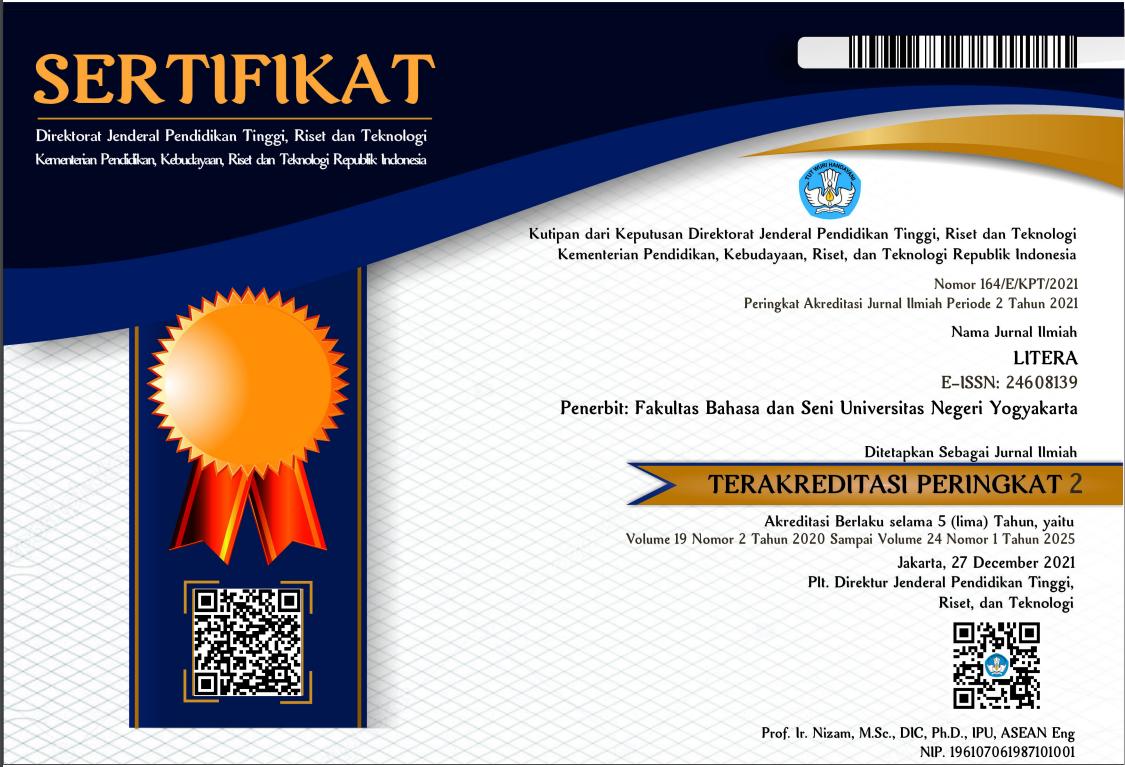ENHANCING STUDENT'S WRITING ABILITY THROUGH CONTEXTUALIZATION PRACTICES
Humaera Silvia Maristy, Universitas Negeri Yogyakarta, Indonesia
Abstract
Penelitian ini bertujuan meningkatkan kemampuan menulis peserta didik Sekolah Menengah Pertama (SMP) Minggir, Sleman, Yogyakarta melalui penggunaan kontekstualisasi pemebelajaran menulis. Untuk mencapai tujuan tersebut, penelitian ini melibatkan 32 orang peserta didik sebagai subjek penelitian dan seorang guru bahasa Inggris sebagai kolaborator peneliti. Jenis penelitian ini dikategorikan ke dalam bentuk penelitian tindakan kelas dengan menerapkan tiga siklus selama pelaksanaan pengambilan data penelitian. Terdapat tiga jenis teknik pengumpulan data penelitian yang digunakan, yakni teknik observasi kelas, wawancara, dan penyebaran kuesioner yang selanjutnya diikuti dengan kondensasi data, penyajian data, dan penarikan kesimpulan yang dimaksudkan untuk mendeskripsikan data kualitatif yang diperoleh dari pengumpulan data di lapangan. Analisis deskriptif kuantitatif juga digunakan untuk menyajikan kemampuan menulis peserta didik yang diperoleh melalui tes menulis teks-teks bahasa Inggris. Berdasarkan hasil analisis, disampikan empat temuan utama. Pertama, penggunaan teknik kontekstualisasi pembelajaran menulis mengubah tingkah laku peserta didik dalam hal motivasi belajar menulis teks-teks bahasa Inggris dan keterlibatan peserta didik dalam pembelajaran menulis yang sebekumnya peserta terlihat pasif menjadi aktif. Kedua, sebagian besar peserta didik merasa mudah dalam mengekspresikan gagasan dengan mengacu pada kontekstualisasi tugas-tugas menulis teks-teks bahasa Inggris yang disampaikan. Ketiga, miskonsepsi dan kesalahan gramatikal dapat diminimasi dalam proses mengkonstruksi teks-teks bahasa Inggris. Keempat, dengan mengacu pada data kuantitatif, skor rerata dari isi, pengorganisasian paragraf, pemilihan kosakata, penggunaan bahasa, dan aspek penulisan mengalami peningkatan yang cukup tajam.
Kata kunci: kontekstualisasi, pengetahuan skematik, kemampuan menulis
Abstract
This study is aimed at improving students’ writing ability of junior high school at Minggir, Sleman, Yogyakarta Minggir, Sleman, Yogyakarta through contextualization practices. To gain the objective, this study voluntarily involved 32 students of junior high school at Minggir, Sleman, Yogyakarta as the subjects of this study and one English language teacher serving as the collaborator. This study applied a classroom action research design with the utilization of three cycles during the data collection practices. Techniques of observation, interview, and questionnaire distribution were employed to gather data followed by data condensation, data display, and conclusion making which were meant to qualitatively analyze the gathered data. Quantitative descriptive analysis was also employed to analyze students’ writing ability with the employment of writing test. The findings document four issues. First, there was a change of behavior on the part of students in the area of motivation to learn and involvement in writing practices. Second, the majority of students found easier to express their ideas in reference to the contextualization practices applied by English language teachers. Third, mis-conception and grammatical mistakes could be minimized in the process of constructing English texts. Fourth, with regard to quantitative data, the average scores of the content, paragraph organization, vocabulary, language use, and mechanics increased sharply.
Key words : contextualization, schematic knowledge, writing ability
Full Text:
PDFReferences
Allwright, D. (1998). Contextual factors in classroom language learning: an overview. in: Malmkjaer, K. and Williams, J. (eds.). Context in Language Teachers and Learners: Investigating the Language Classroom. Cambridge: Cambridge University Press.
Brown, H. (2004). Language Assessment Principals and Classroom Practices.New York: Longman.
Brown, H., & Lee, H. (2015). Teaching by Principles: An Interactive Approach to language Pedagogy (4th Ed.). New York: Pearson Education ESL.
Burns, A. (2010). Doing Action Research in English Language Teaching: A Guide for Practioners. New York: Taylor and Francis Group.
Haris, D. P. (1974). Testing English as a Second Language. New York: McGraw Hill Book Company.
Hedge, T. (2008). Teaching and Learning in the Language Classroom. New York: OUP.
Langan, J. (2012). English Skills (10th Ed.). New York: McGraw-Hill Companies, Inc.
Lee, H., & Yee-Sakamoto, I. (2012, October). Contextulized Pedagogy: New Eductional approach in the postmodern era. The Journal of Multicultural Education. 8(2). Retrieved from http://www.wtamu.edu/journal/volume-8-number-2.aspx
Margana. (2011). The Importance of Situational Context in Teaching Speaking as one of Productive Language Skill. Journal of the 8th National JETA Conference, 84-85 Retrieved from http://staff.uny.ac.id/files/JETA_8_2011
Margana.(2012). Teaching Young Learners with the Use of Contextualized Language Instruction. Journal of the 2nd National Conference of Young Learners in Indonesia (TEYLIN). Retrieved from http://staff.uny.ac.id/sites/default/files/penelitian/Dr.%20Margana,%20M.Hum.,M.A./TEYLIN_2011_UMK.pdf
McDonough, J., Shaw, C., & Masuhara, H. (2013). Materials and Methods in ELT: A Teacher's Guide (3rd edition). Oxford: Wiley-Blackwell
Miles, M. B., Huberman, A. M., and Saldana, J. (2014). A Method Sourcebook: Qualitative Data Analysis (3rd Ed.). London: Sage Publications, Ltd.
Nemati, A. (2010). Enhancing Long-term Retention by Memory Vocabulary Learning Strategies. The Journal Of Asia TEFL Vol. 7, No. 1, pp. 171-195. Retrieved from
http://r.search.yahoo.com/_ylt=a2okmjkecetybtoanbxlqwx.;_ylu=x3odmteyohvnczntbgnvbg8dc2czbhbvcwmxbhz0awqdstazmzbfmqrzzwmdc3i/rv=2/re=1491827103/ro=10/ru=http%3a%2f%2fwww.asiatefl.org%2fmain%2fdownload_pdf.php%3fi%3d185%26c%3d1419308389/rk=0/rs=mjzjha8adj7ipz7bpm5dvoodr3g-
Nemati, A. (2009). Memory Vocabulary Learning Strategies and Long-term Retention. International Journal of Vocational and Technical Education Vol.1 (2), pp. 014-024, October 2009. Retrieved from http://www.academicjournals.org/article/article1379328836_Nemati.pdf
Nieder´ee, C. (2015). Learning from Human Memory: Managed Forgetting and Contextualized Remembering for Digital Memories. Proceedings of the 5th International Workshop on Semantic Digital Archives (SDA 2015). Retrieved from http://ceur-ws.org/Vol-1529/paper1.pdf
Perin, D. February (2011). Facilitating Student Learning Through Contextualization. CCRC Working Paper No. 29. Retrieved from http://ccrc.tc.columbia.edu/publications/facilitating-student-learning-contextualization.html?UID=882
Richards, J.C. and Renandya, W.A. Ed. (2002). Methodology in Language Teaching: An Anthology of Current Practice. Cambridge: Cambridge University Press.
Wardhaugh, R. & Fuller, J. M. (2015). An Introduction to Sociolinguistics— 7th ed. Oxford: Blackwell Publishing Ltd.
Weigle, S.C. (2002). Assessing Writing. Cambridge: Cambridge University Press.
DOI: https://doi.org/10.21831/ltr.v19i2.33348
Refbacks
- There are currently no refbacks.
______________________
__________________________________________________________________________________________________
Litera Journal is published by the Faculty of Languages, Arts, and Culture Universitas Negeri Yogyakarta in collaboration with Himpunan Sarjana Kesusasteraan Indonesia (HISKI)
The International Journal of Linguistic, Literature, and Its Teaching at http://http://journal.uny.ac.id/index.php/litera/ is licensed under a Creative Commons Attribution-ShareAlike 4.0 International License
__________________________________________________________________________________________________















